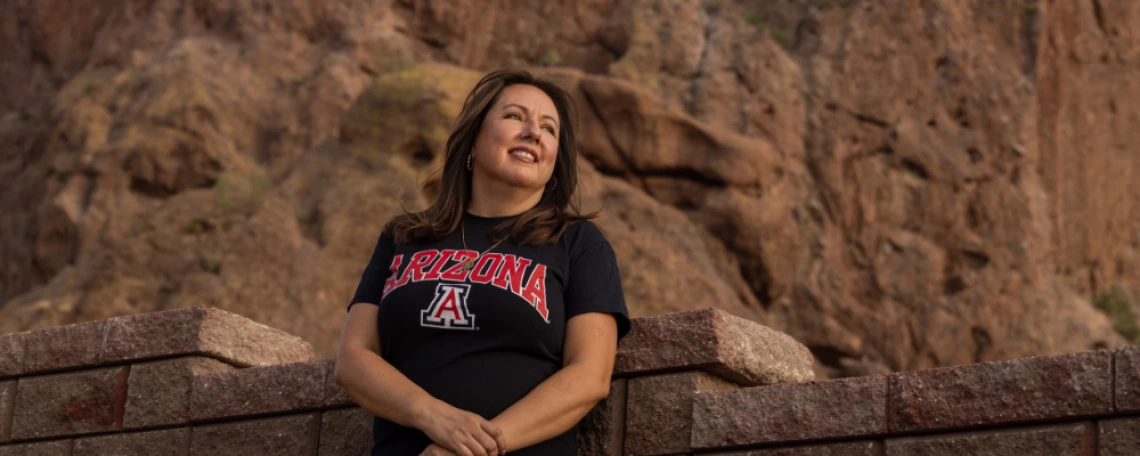'There's Always a Way'
With scholarships and mentorship, 40-year-old Hispanic Alumni Club lights paths forward

August 8, 1993, fell on a Sunday. In Tucson, some likely congregated on the shaded patio of the Blue Willow, waking up slowly over pancakes and eggs, and others at the trailhead for Seven Falls. By 2 p.m., temperatures hit an even 100 degrees, and before the dinner hour rain came down steadily — about half an inch — as thunder rolled over the Sonoran Desert. By nightfall, only an overcast sky remained.
It was, in other words, a typical 24 hours for Tucson in late summer. But for Melisa Celaya, then a rising University of Arizona sophomore, that day in an expanse of desert days held outsized import.
And for her future sisters, the same was bright and true as the desert sun.
On August 8, 1993, Celaya, along with seven others, founded the Wildcat chapter of Gamma Alpha Omega, only the second multicultural sorority on campus. The group at first welcomed mostly Latina students — but without some help, Celaya might never have been involved.
For Celaya, just piecing together the money to attend school had been a trial: Because of corporate downsizing, her father had recently been laid off, so when she had traveled to Tucson from her family’s home in Phoenix for her first year, she had made her own way.
That’s where the UArizona Hispanic Alumni Club, founded in 1982 to support Hispanic students across the state, had entered her life, awarding a tuition scholarship. The money did not cover everything, but it sewed sturdy patches.
“It came,” Celaya says, “in a very timely [moment] in my life.”
Today, Celaya is a research assistant professor in internal medicine at the College of Medicine – Phoenix, a Wildcat triple-graduate and a mother of three. In 1993, she was a student who could remain in Tucson — and, through Gamma, make college better for others.
Her story reflects the intertwined fates of the Hispanic Alumni Club, known broadly as UAHA, and its two thousand-plus scholarship recipients. UAHA, 40 years old this fall, eases access to school for top-notch students and offers mentorship and community, working in cooperation with the Mexican American Studies Department and the Adalberto and Ana Guerrero Student Center.
Gamma, with Celaya and her co-founders at the helm, achieved liftoff, ushering in sisters of color and shifting meetings from Drachman Hall to the James E. Rogers College of Law when the Drachman space became too small.
Celaya earned her B.A. in 1997 and in 2003, by then a parent, her master’s. She chased her academic goals all the way through a Ph.D. in epidemiology and biostatistics, supported by her mother, who never attended college. She would often tell Celaya, before her passing on Christmas Day 2021, that she “lived through the experience with [her].”
Celaya’s father, like her mother, never earned a degree. Called away after enlisting during the Vietnam War era, he studied in Tucson for about six months. But beside her mother, he remained her first and best role model until his passing in 2012.
In December, Celaya’s firstborn will graduate from Arizona State University, reflecting what early UAHA leader Marty Cortez calls “generational expansion”: With changes in opportunity come changes in outcome.
Without clubs such as UAHA, of course, those changes might be harder — though never impossible — to come by.
These days, Celaya reflects on her journey with gratitude for both UAHA and Gamma — for her lasting friends and mentors during and after school. Such connections, she says, light paths forward.
Celaya knows that for students in financial binds like hers, the path can’t be easy. But, she says, it is always navigable. And this is the truth she wants future UAHA scholars to hold.
“It doesn’t matter how determined and how successful you are,” she says. “There will always be a time where you think, ‘This is too much,’ and you will second guess if you can do it. And you definitely can.”
“There’s always a way. You just need to ask for help.”
UAHA Scholarships
UAHA reviews applications and makes award recommendations for over 120 scholarship recipients each year. The funds come from two pass-through scholarships, six endowments and a tuition scholarship funded by the University of Arizona. Thanks to all who have contributed to the UAHA Club Scholarship, as well as the Julieta Bustamante Memorial Scholarship, the Naomi Estrada-Weber Memorial Scholarship, the Alejandro and Josefa Islas Scholarship, the Pacheco Hispanic Alumni Club Endowment, the Rosalio and Virginia Ronquillo Mexican American Scholarship, the Richard C. Salvatierra Memorial Scholarship, and the Edward and Phyllis F. Soza Scholarship.
—Matt Morris

